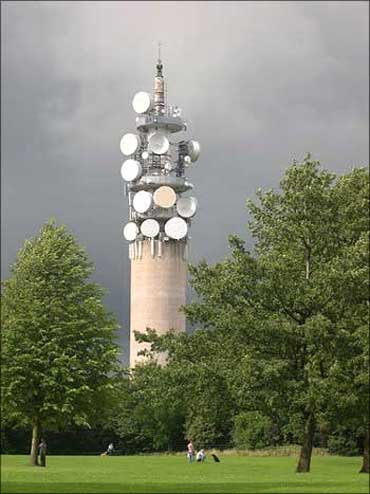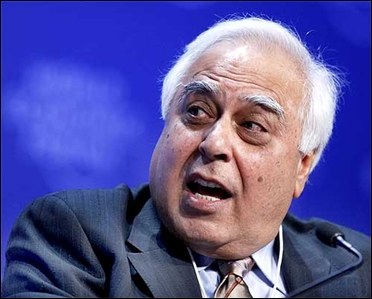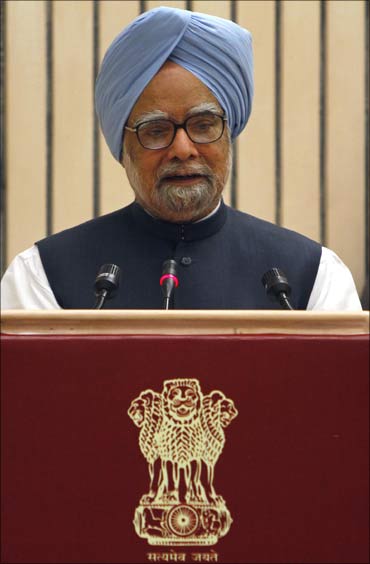Photographs: Reuters A Correspondent in New Delhi
Hyperactive Telecom Minister Kapil Sibal -- busy trying to 'rescue' the UPA government in the 2G scam ever since he took over after Andimuthu Raja resigned in November -- finds himself caught up in another spectrum scam of the Indian Space Research Organisation's gift of 70Mhz at throwaway prices to its former officer in 2005 that is now turning out to be a Rs 2-lakh crore (Rs 2 trillion) scandal.
He was part of the Space Commission as a member in his capacity then as the minister of state for science and technology that cleared the deal. And it was his note on which the deal was sealed with the Union Cabinet's nod back in 2005.
The Cabinet Secretary, then National Security Adviser M K Narayanan (now West Bengal Governor), and the ISRO chairman were the other members of the Space Commission.
Prime Minister Manmohan Singh might find it difficult to wash his hands of this mess as he not only chairs the Cabinet meetings but was also briefed by Cabinet secretary K M Chandrasekhar last year on need to cancel ISRO's deal at a ridiculously low price of Rs 1,000 crore (Rs 10 billion), in view of the huge sums of Rs 1.06 lakh crore (Rs 1.06 trillion) received in auction of the 3G spectrum.
. . .
ISRO spectrum deal had Cabinet nod?
Image: Telecom Minister Kapil Sibal.Photographs: Reuters
He also heads the Department of Space (DoS) that did not order the cancellation of the ISRO contract, with the Bengaluru-based Devas Multimedia Pvt Ltd headed by ISRO's former scientific advisor Dr M G Chandrasekhar, even after getting an opinion from the law ministry last year in response to the Cabinet secretary's query that ISRO is within its rights to cancel the contract signed on its behalf by its commercial arm Antrix Corporation with Devas.
Sibal may also have to explain why the Department of Telecom is sitting over a recommendation of the Telecom Regulatory Authority of India last May to allow review of the usage of the spectrum available with various government agencies to enable it to schedule release of spectrum to the telecom sector for speedier rollout of the telecom and broadband services in the country.
DoT is the custodian of the spectrum or airways in India and an estimated 55 per cent of the available 1,161 Mhz spectrum is with government agencies, including DoS and defence ministry.
Although the government may act fast to scuttle the Devas contract to wriggle out of the direct charges levelled by the Opposition on the prime minister, for the scam that is bigger than the irregularities in the 2G spectrum allocation, it cannot shut off the reality of Devas attracting huge investments from abroad -- like the telecom players buying 2G airways cheap and selling them at huge profits.
. . .
ISRO spectrum deal had Cabinet nod?
Photographs: Reuters
The catch in the Devas contract is that the company can offload the excess spectrum with it to others if it is not able to utilise all 70Mhz and there is bound to be a big race among the private telecom operators to seize part of it instead of knocking doors of DoT all the time for access to more spectrum.
While Devas offloaded its 36,749 shares worth $75 million to Singapore-based Deutsche Telekom Asia Pte Ltd, it also took other investors, many from the tax heaven Mauritius that launders Indians' black money received through hawala route and ploughs it back in the name of the companies that can be easily registered in that country.
Two Mauritius-based companies -- CC/Devas (Mauritius) Ltd and Telecom Devas Mauritius Ltd were issued 15,730 convertible cumulative preferential shares each on March 16, 2006 at a huge premium of Rs 21,445.82 for the shares with equity value of Rs 10 each, only few months after the company got the scarce spectrum.
These two Mauritius companies were further allotted 15,619 shares each in three tranches.
. . .
ISRO spectrum deal had Cabinet nod?
Image: Prime Minister Manmohan Singh.Photographs: Reuters
The balance sheet of Devas Multimedia shows that its capital shot up eight times in only three years from Rs 67.5 crore (Rs 675 million) on March 31, 2007 to Rs 578.82 crore (Rs 5.788 billion) in 2010. In fact, the capital investment went up by Rs 123 crore (Rs 1.23 billion) in just one year between 2009 and 2010.
Since after allotment of the scarce S-band spectrum, that was once used by Doordarshan for serving remote areas through satellite, the company raised several hundred crore (billions) and even made investments in mutual funds and financial institutions.
An interesting explanation from Antrix Corporation Ltd that made the deal with Devas, which also includes use of two satellites to be launched specifically for it, is that ISRO was burdened with unused S-band spectrum that was vacated by Doordarshan and it readily agreed to give 70 Mhz from it to Devas when it approached ISRO.
It argues that no other company had approached it as otherwise they too would have been given the spectrum instead of letting it lie idle.






article